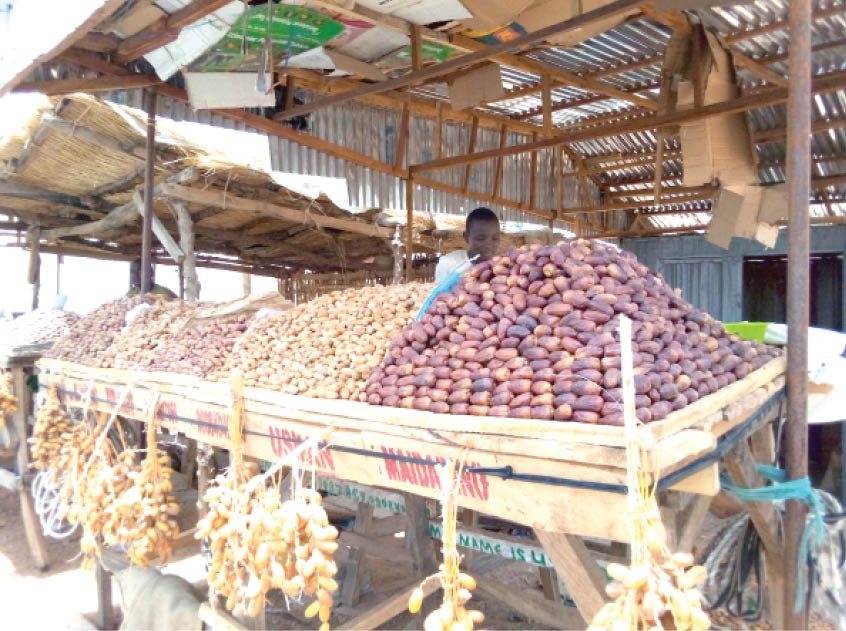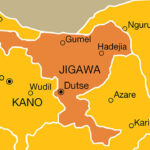Shuwarin Junction in Kiyawa Local Government Area of Jigawa State is not only a major transit road connecting Kano to Jigawa to the northeastern part of the country, but also as a major depot for date products in that axis.
Because of this, thousands of travellers on that route stop over to patronise the products.
- 2023: IPAC rejects NDLEA’s proposal for drug test on aspirants
- 49 officers, 1,549 recruits inducted into armed forces
Findings indicate that because of the religious significance of dates, especially during the breaking of fast in the month of Ramadan, and the awareness of its health benefits for fasting Muslims, its patronage increased significantly this year.
Checks indicate that despite the fact that Jigawa is one of the states in the North West where it is farmed in a large scale, the price of the product appears to be on the increase.
Apart from Jigawa, Bauchi, Kano, Gombe, Borno, Yobe and parts of Adamawa states also cultivate dates.
It is also brought into the country from other parts of Africa, such as Niger Republic, Chad, Mali and North African countries like Algeria and Tunisia, among others.
A market survey carried out by Daily Trust on Sunday at both Shuwarin and Dutse town indicated fluctuation in the price of the products this year as against the previous years. For instance, while there is stability in the price of the dates produced in Nigeria and Niger Republic, those from Mali and Algeria have experienced slight increase.
While the big mudu of Dutse products, popularly referred to as Dan Dutse and Niger Republic products, otherwise called Dan Niger, are sold at between N1,800 and N2,000 in Shuwarin depot, the same measures of the products are sold inside Dutse metropolis between N2,000 and N2,500 per mudu.
Malam Muhammad Ismail, a consumer of dates, lamented the high increase in its price this year. This, he said, had affected the purchasing power of consumers. For example, Muhammad claimed that five days before the commencement of this year’s Ramadan fasting, he bought about four mudus at N1,800 at the Investment Area in Dutse metropolis, but the same measure later rose to N2,200 and N2,500 per mudu.
He said that despite the increase in price, he still patronised the products as he used it to breakfast.
Malam UmaruMaidabino, a date retailer at the Investment Area agreed with Ismail that there has been slight increase in the price of dates during the fasting, when compared to the period before the commencement of the Ramadan fast. He attributed the increase to the cost of bringing the products into the state capital, especially when viewed against the background of the recent increase in the price of petrol, which resulted in the jerking up of transportation fares by the transporters.
He said date sellers made good sales during the period, which also translated to good fortunes for the farmers.
A date seller, Usman Musa, however, insisted that contrary to the claims, the price of the products remained stable in Shuwarin. He, however, admitted that it was possible that the price could be increased in some other parts of Dutse, but because they were strictly regulated by their umbrella association, no date seller in the area could arbitrarily increase the price of the product.
According to Usman, who claimed he had spent over seven years in the trade, apart from the importation from Mali and Algeria, which prices have “slightly” increased, those of Dutse and Niger Republic witnessed downward pricing during this Ramadan.
Musa insisted that the hike in price of imports from Mali and Algeria had nothing to do with the Ramadan but the cost of bringing them into the country.
“You know these are not produced here; they are brought in from far places, and as you know, we have to pay taxes on some of the products we bring into the country.
“You were asking if the fasting was responsible for the rise in price of dates in the state, and I can tell you that it is not, because here, we are all Muslims, so we know the value of dates to a fasting faithful, so we cannot increase the price of dates to a fasting Muslim,’’ he said.
Beside the high cost of bringing in the products, Alhaji Abubakar Yakubu Gongo, the vice chairman of the Jigawa Dates Farmers Association, also attributed the slight increase to the crave by Nigerians for the so-called foreign products.
In an interview, Gongo said, “Why theirs appear more expensive than ours is because of the usual Nigerians’ ways of viewing foreign imports. However, it is not peculiar to Nigeria, if you take Nigeria’s productive to Niger, you discover that ours will be more expensive there too because naturally, we humans appear more interested in foreign products. So, in the same vein, whenever theirs come here, we seem to attach more attention to it, simply because it is foreign.’’
He said farmers made good sales during the Ramadan period when the price was a little bit high.
An official of the Nigerian Institute of Oil Palm Research (NIFOR), dates palm sub-station in Dutse, said Nigeria had a variety of dates that could compete favourably in the international market.
Despite the potentials of the country as a producer of dates, the country is not listed among the dates-producing countries of the world.
Egypt, Algeria, Tunisia, Morocco, Iraq, Saudi Arabia and others are among the world’s leading dates-producing countries. The official, who pleaded not to be named, said although Nigeria had different varieties of date palm, the country is not yet recognised as one of the producers of dates in the world.
He attributed the lack of international recognition of Nigerian date palms to several factors, ranging from inadequate plantation to lack of official interest, especially in the areas of research and funding.
He admitted that of late, governments had started showing remarkable interest in the development of the product to compete in the international market.

 Join Daily Trust WhatsApp Community For Quick Access To News and Happenings Around You.
Join Daily Trust WhatsApp Community For Quick Access To News and Happenings Around You.


